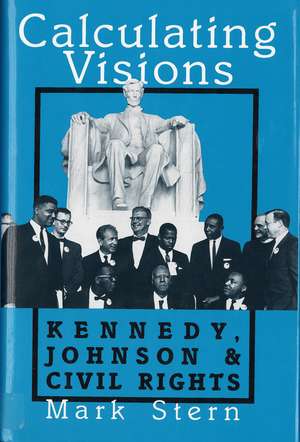Calculating Visions: Kennedy, Johnson, and Civil Rights: Perspectives on the Sixties series
Autor Mark J. Sternen Limba Engleză Paperback – feb 1992
In June 1963, in the midst of national turmoil brought about by civil rights demonstrations, John Kennedy sent his administration's first major civil rights bill to the Congress. Still unsure about this move, he asked his brother Robert, "Do you think we did the right thing?" Within days of assuming the presidency, Lyndon Johnson publicly committed himself to civil rights as a "memorial" to his predecessor. Privately he told Georgia's Senator Richard Russell, the leader of the South in Congress, "Dick, you've got to get out of my way. I'm going to run you over." President Johnson would not compromise or equivocate on civil rights. John Kennedy of Massachusetts yielded to the pressure of events and became an ally of the movement, despite his fear that supporting civil rights could cost him votes in Congress and the nation. Lyndon Johnson of Texas, whom liberals loathed because he often gutted their prize legislation, became the committed champion of civil rights. Together their administrations became synonymous with the Second Reconstruction, though neither president had a prior record of strong civil rights commitment. Mark Stern explains how each man pursued power and votes, and ultimately redirected his own course of action and altered the nation's future.
Preț: 292.47 lei
Nou
Puncte Express: 439
Preț estimativ în valută:
55.97€ • 60.78$ • 47.02£
55.97€ • 60.78$ • 47.02£
Carte tipărită la comandă
Livrare economică 23 aprilie-07 mai
Preluare comenzi: 021 569.72.76
Specificații
ISBN-13: 9780813517445
ISBN-10: 0813517443
Pagini: 328
Ilustrații: 23
Dimensiuni: 241 x 165 x 23 mm
Greutate: 0.46 kg
Ediția:None
Editura: Rutgers University Press
Colecția Rutgers University Press
Seria Perspectives on the Sixties series
ISBN-10: 0813517443
Pagini: 328
Ilustrații: 23
Dimensiuni: 241 x 165 x 23 mm
Greutate: 0.46 kg
Ediția:None
Editura: Rutgers University Press
Colecția Rutgers University Press
Seria Perspectives on the Sixties series
Notă biografică
MARK STERN is a professor of political science and director of the University Honors Program at the University of Central Florida.
Cuprins
John F. Kennedy: reluctant hero of the civil rights movement. Pursuing the presidency
An intimidated president
A reluctant participant
A reluctant commitment
Lyndon B. Johnson : coincident hero of the second black reconstruction. From Texan to national politician
Creating a liberal presidency
Forging the election coalition
The second great emancipator
An intimidated president
A reluctant participant
A reluctant commitment
Lyndon B. Johnson : coincident hero of the second black reconstruction. From Texan to national politician
Creating a liberal presidency
Forging the election coalition
The second great emancipator
Descriere
President Johnson would not compromise or equivocate on civil rights. John Kennedy of Massachusetts yielded to the pressure of events and became an ally of the movement, despite his fear that supporting civil rights could cost him votes in Congress and the nation. Lyndon Johnson of Texas, whom liberals loathed because he often gutted their prize legislation, became the committed champion of civil rights. Together their administrations became synonymous with the Second Reconstruction, though neither president had a prior record of strong civil rights commitment. Mark Stern explains how each man pursued power and votes, and ultimately redirected his own course of action and altered the nation's future.




















